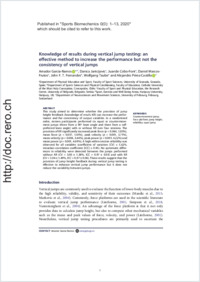Knowledge of results during vertical jump testing: an effective method to increase the performance but not the consistency of vertical jumps
- García-Ramos, Amador Department of Physical Education and Sport, Faculty of Sport Sciences, University of Granada , Granada, Spain - Department of Sports Sciences and Physical Conditioning, Faculty of Education, Catholic University of the Most Holy Conception , Concepción, Chile
- Janicijevic, Danica Faculty of Sport and Physical Education, the Research Centre, University of Belgrade , Belgrade, Serbia
- Cobo-Font, Juande Department of Physical Education and Sport, Faculty of Sport Sciences, University of Granada , Granada, Spain
- Marcos-Frutos, Daniel Department of Physical Education and Sport, Faculty of Sport Sciences, University of Granada , Granada, Spain
- Fernandes, John F. T. Sport, Exercise and Well-being Arena, Hartpury University , Hartpury, UK
- Taube, Wolfgang Department of Neurosciences and Movement Sciences, University of Fribourg , Fribourg, Switzerland
- Pérez-Castilla, Alejandro Department of Physical Education and Sport, Faculty of Sport Sciences, University of Granada , Granada, Spain
-
22.06.2020
Published in:
- Sports Biomechanics. - 2020, vol. 0, no. 0, p. 1–13
English
This study aimed to determine whether the provision of jump height feedback (knowledge of result; KR) can increase the performance and the consistency of output variables. In a randomised order, sixteen participants performed six squat or countermovement jumps (three from a 90º knee angle and three from a self-preferred knee angle) with or without KR over four sessions. The provision of KR significantly increased peak force (p = 0.046, 1.83%), mean force (p = 0.037, 1.45%), peak velocity (p < 0.001, 3.71%), mean velocity (p = 0.004, 3.44%), peak power (p < 0.001, 4.22%) and mean power (p = 0.001, 4.69%). A high within-session reliability was observed for all variables (coefficient of variation [CV] ≤ 5.62%, intraclass correlation coefficient [ICC] ≥ 0.95). No systematic differences in reliability were detected between the jumps performed without KR (CV = 3.00 ± 1.38%, ICC = 0.97 ± 0.03) and with KR (CV = 3.04 ± 1.49%, ICC = 0.97 ± 0.04). These results suggest that the provision of jump height feedback during vertical jump testing is effective to enhance vertical jump performance but it does not reduce the variability between jumps.
- Faculty
- Faculté des sciences et de médecine
- Department
- Département de Médecine
- Language
-
- English
- Classification
- Sports sciences
- License
- License undefined
- Identifiers
-
- RERO DOC 328857
- DOI 10.1080/14763141.2020.1764090
- Persistent URL
- https://folia.unifr.ch/unifr/documents/308702
Statistics
Document views: 74
File downloads:
- tau_krd.pdf: 406
